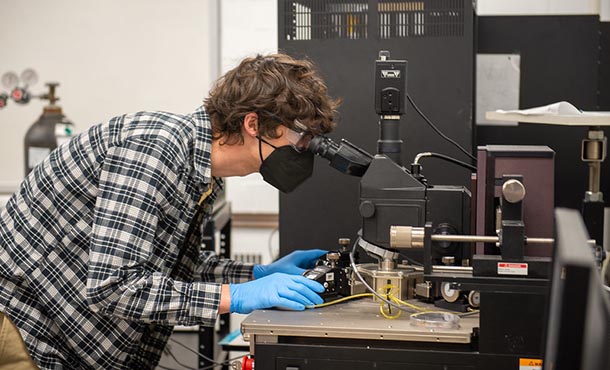
Derrick Butler, a third-year doctoral student in the Penn State Department of Electrical Engineering, will use his ECS summer fellowship to develop electroanalytical devices for a wide range of applications. IMAGE: PENN STATE COLLEGE OF ENGINEERING
Electrical engineering grad student receives Electrochemical Society fellowship
6/10/2021
By Sarah Small
UNIVERSITY PARK, Pa. — Derrick Butler, a third-year doctoral student in the Penn State Department of Electrical Engineering, was awarded the Electrochemical Society (ECS) Joseph W. Richards Summer Fellowship. The ECS summer fellowships were established to help support students pursuing work in the fields related to ECS during the summer months.
"Derrick’s nomination and selection to receive this year's ECS Fellowship recognizes his potential and bright future as a talented researcher in the field,” said Aida Ebrahimi, assistant professor of electrical engineering and Butler’s adviser. "He is working on advancing 2D materials as transducing elements in developing robust and accurate electroanalytical devices for [a wide range of] applications."
Butler will use the $5,000 fellowship funding to support the continuation of his two main research projects. The first project — funded by the National Science Foundation IUCRC ATOMIC center — is engineering new materials and their use in the development of sensors that simultaneously detect different neurochemicals and hormones such as dopamine, epinephrine and norepinephrine for noninvasive health monitoring.
“Detecting these neurochemicals without first modifying the sensor with a bioreceptor for selectivity has been challenging up to this point because, from an electrochemical standpoint, their signatures are pretty similar,” Butler said. “We’re working on understanding the process parameters affecting material-biomarker interactions to develop sensors that can distinguish between them without the use of antibodies or other more complex biomolecules.”
The knowledge gained in this research is expected to enable use of these materials in platforms for noninvasive monitoring of different biomarkers and alert the user to potential issues at the point of care, according to Butler.
“The current methods used for this type of monitoring generally take place in laboratory or clinical settings,” he said. “We’d like to improve portability and make devices that are lower cost, easier to use and more readily available.”
The second project — funded by the National Institutes of Health — focuses on monitoring bacteria conjugation, through which bacteria exchange genetic information.
“We’re developing an electronic sensor chip based on 2D materials to monitor and understand the dynamics of bacteria conjugating with one another,” Butler said.
Butler received his bachelor of science degree in physics from the University of Vermont and his master of science in engineering degree in materials science from the University of Pennsylvania before beginning his doctoral program in electrical engineering at Penn State in 2018.
In April 2020, Butler initiated and became president of the Penn State Electrochemistry Club, later becoming an official ECS student chapter.
“At that point we were working remotely, and I thought it would be a good idea to join a student organization to keep in touch with other students who shared an interest in electrochemistry,” he said, noting that no organization existed at Penn State at the time. “It seemed like a good opportunity to start a student chapter of ECS here, and I was very fortunate in that my adviser, research group members and many other students and faculty were supportive and helpful throughout the entire process.”
The organization is now in its second year and growing, despite the challenges of establishing the chapter during remote learning and instruction.
“The chapter has about 30 members, and we have gotten to know one another much better over the past year,” Butler said. “It has been a great learning experience so far, and we are looking forward to continuing to grow and promote electrochemistry at Penn State.”
The results of Butler’s summer research will be published in the 2021 winter issue of Interface, the ECS’s quarterly member magazine.
The Electrochemistry Society (ECS)
ECS, a prestigious nonprofit professional society, has led the world in electrochemistry, solid state science and technology, and allied subjects since 1902. By publishing research, hosting meetings, fostering education and collaborating with other organizations, ECS advances scientific theory and practice. Our 8,000+ member community in 85+ countries develops innovative solutions to major global challenges. The ECS Digital Library, hosted on IOPscience, encompasses 160,000+ journal and magazine articles and meeting abstracts, and the Journal of The Electrochemical Society, the oldest peer-reviewed journal in its field. Scientists, engineers and industry leaders share relevant scientific developments, network and expand research horizons at ECS biannual, co-hosted and sponsored meetings. ECS welcomes students’ participation in the Electrochemical Society and hopes to play a helpful role in students’ transition to a practicing professional through the fellowship program and other opportunities.



